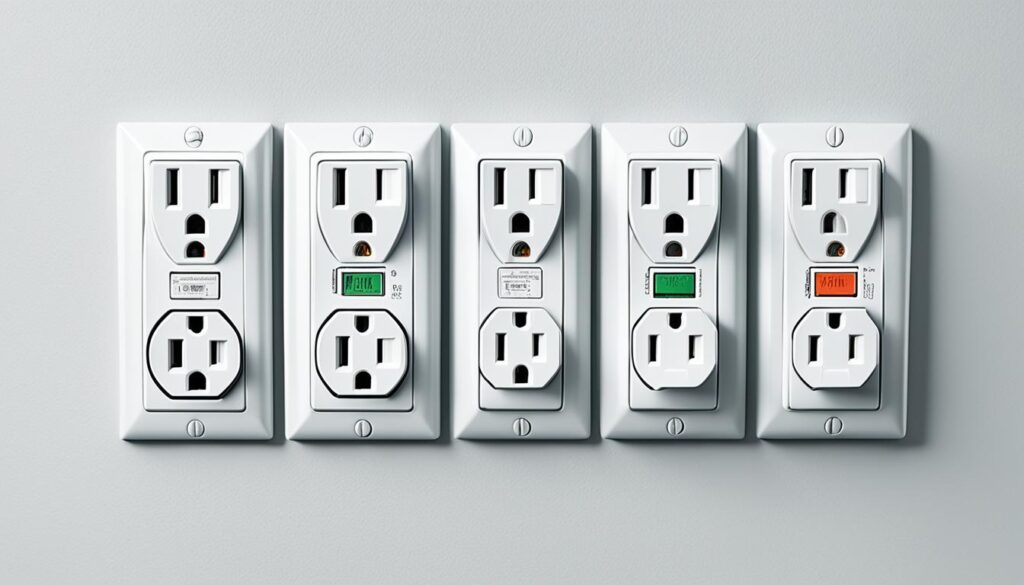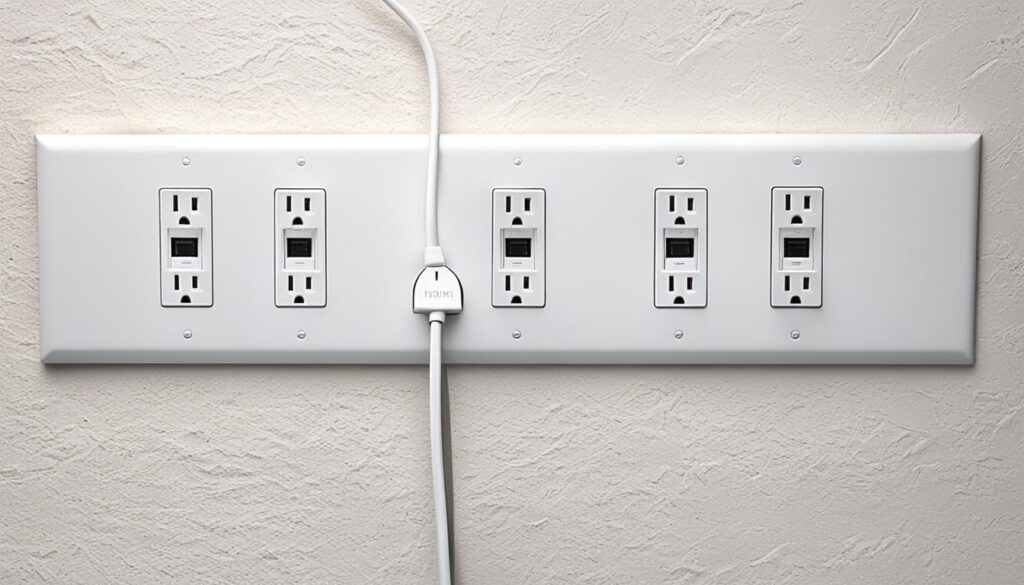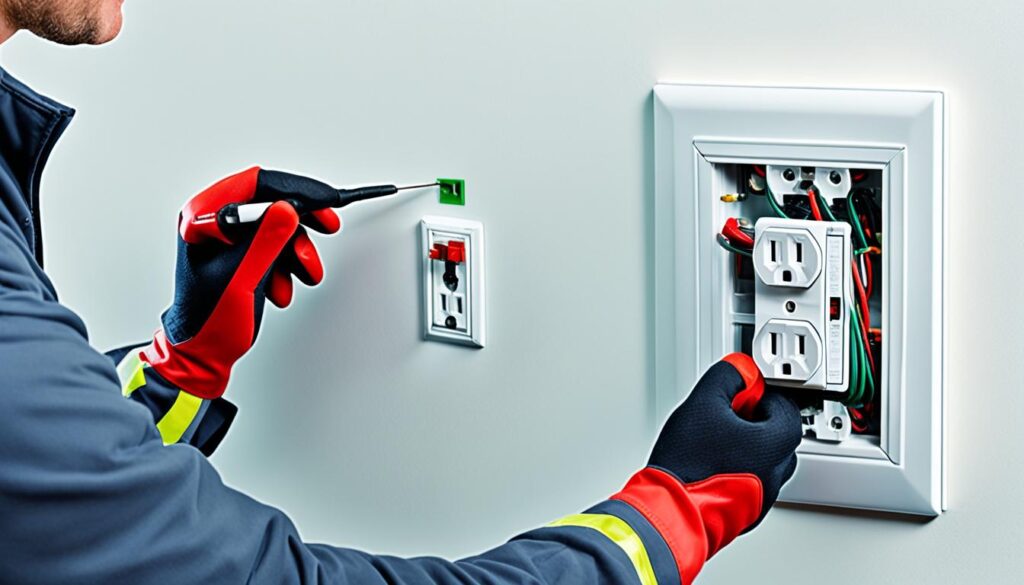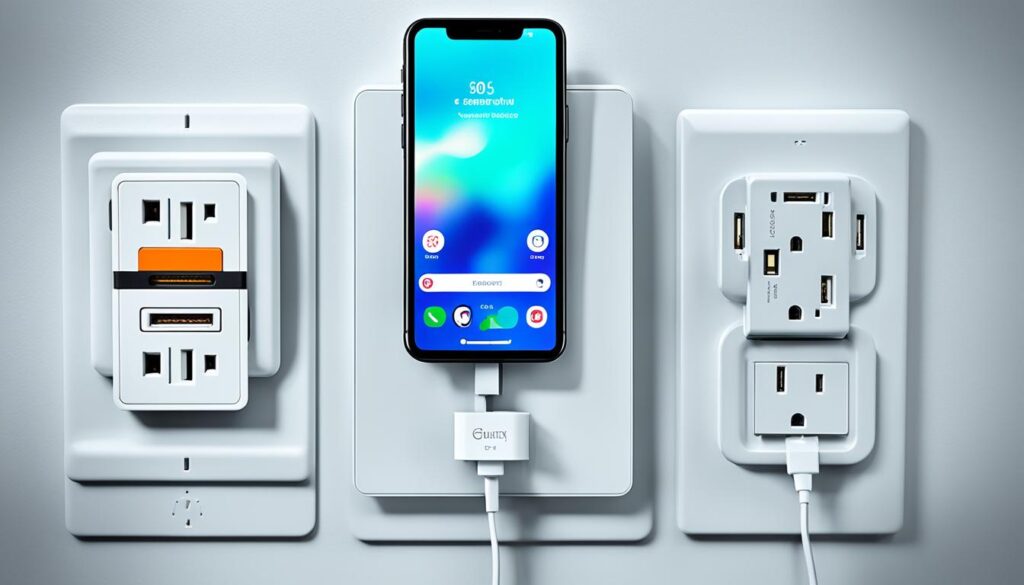When it comes to managing the electrical needs of your home, understanding electric outlets is essential. From the commonly used power outlets to the different types available, knowing the ins and outs will help you make informed decisions about their installation and safety. In this guide, I will provide you with valuable information on electric outlets, covering everything from their various types and safety considerations to proper installation techniques.
Key Takeaways:
- There are different types of electric outlets available, each with its own unique features and purposes.
- Common types of electric outlets include USB mains sockets, remote-control mains sockets, and mains timer sockets.
- In the United States, some commonly used outlets include the 15-amp outlet, 20-amp outlet, GFCI outlets, AFCI outlets, USB outlets, tamper-resistant outlets, smart outlets, and combination outlets.
- Safety considerations for electric outlets include using GFCI outlets, AFCI outlets, and tamper-resistant outlets in appropriate areas.
- Proper installation of electric outlets is crucial for safety and functionality, it is always recommended to have it done by a qualified electrician.
Types of Electric Outlets
Electric outlets come in different types to cater to various applications. Understanding the different outlet types can help you determine which ones best suit your needs. Here are some common types:
1. USB mains sockets
USB mains sockets are designed to allow charging devices via a USB cable. This type of outlet is becoming increasingly popular as more devices utilize USB charging.
2. Remote-control mains sockets
Remote-control mains sockets give you the ability to control which socket is active from a distance. This can be convenient when you want to turn devices on or off without physically accessing the outlet.
3. Mains timer sockets
Mains timer sockets can be set to activate only during specified operating hours. This is beneficial for energy efficiency, allowing you to control when power is supplied to devices.
These are just a few examples of the different types of electric outlets available. Each type offers unique features and benefits, so it’s important to consider your specific needs when choosing the right outlet for your application.

| Outlet Type | Description |
|---|---|
| USB mains sockets | Allow charging devices via a USB cable. |
| Remote-control mains sockets | Enable users to control which socket is active from a distance. |
| Mains timer sockets | Can be set to activate only during specified operating hours. |
Common Electric Outlets in the United States
When it comes to electric outlets in the United States, there are several commonly used types that suit different power needs and safety requirements. Let’s take a look at these outlets and their unique features:
15-Amp Outlet
The 15-amp outlet is a standard outlet found in most residential settings. It is designed to handle devices that use less power, such as lamps, small appliances, and electronics.
20-Amp Outlet
For higher-powered devices, the 20-amp outlet is recommended. It can handle larger electrical loads, making it suitable for heavy-duty appliances like refrigerators, air conditioners, and power tools.
GFCI Outlets
GFCI outlets, or Ground Fault Circuit Interrupter outlets, provide an extra layer of protection against electrical accidents. They automatically shut off power to the outlet if they detect any electrical faults or imbalance, minimizing the risk of electric shock.
AFCI Outlets
AFCI outlets, or Arc Fault Circuit Interrupter outlets, help prevent fires caused by electrical arcs. They can detect dangerous arcing conditions that may occur due to damaged wiring, loose connections, or overheating, and immediately cut off power to the outlet.
USB Outlets
In today’s digital age, USB outlets have become increasingly popular. These outlets have built-in USB ports that allow you to directly charge devices like smartphones, tablets, and smartwatches without needing a separate adapter.
Tamper-Resistant Outlets
Tamper-resistant outlets are designed with built-in safety mechanisms to protect children from electrical hazards. They have spring-loaded shutters that prevent foreign objects, such as keys or fingers, from being inserted into the slots, reducing the risk of shocks or burns.
Smart Outlets
Smart outlets offer the convenience of controlling electrical devices remotely. These outlets can be connected to a home automation system or controlled through a smartphone app, allowing you to turn appliances on or off from anywhere.
Combination Outlets
Combination outlets combine a traditional electrical outlet with a switch in one unit. They are commonly used in rooms where both lighting control and power outlets are needed, such as bedrooms, living rooms, or offices.
Understanding the different types of electric outlets available in the United States can help you make informed decisions when it comes to your electrical needs. Whether you require outlets for low-power devices, high-power appliances, enhanced safety features, or smart functionalities, there is a wide range of options to choose from.
Now that we have explored the common electric outlets, let’s move on to the safety considerations associated with these outlets in Section 4.

Safety Considerations for Electric Outlets
When it comes to electric outlets, prioritizing safety is of utmost importance. By taking the necessary precautions and installing the right types of outlets, you can significantly reduce the risk of electrical accidents and ensure a safe living environment.
The Importance of GFCI and AFCI Outlets
GFCI (Ground Fault Circuit Interrupter) outlets and AFCI (Arc Fault Circuit Interrupter) outlets are two types of outlets that provide additional safety measures. GFCI outlets are specifically designed to protect against electrical shock when water and electricity come into close proximity, such as in bathrooms and kitchens. They monitor the flow of electricity and can quickly shut off power if any imbalance or ground fault is detected.
AFCI outlets, on the other hand, are designed to prevent electrical fires caused by arc faults. Arc faults can occur when there are loose or damaged wires, faulty appliances, or overloaded circuits. AFCI outlets constantly monitor the electrical current and can immediately detect any dangerous arc fault situations, cutting off power to prevent fires.
Tamper-Resistant Outlets for Added Safety
Tamper-resistant outlets are highly recommended, particularly for households with young children. These outlets feature built-in safety shutters that prevent foreign objects, such as keys or paperclips, from being inserted into the slots. This helps prevent accidental shocks and injuries, providing added peace of mind.
“Installing GFCI and AFCI outlets, and opting for tamper-resistant outlets, are important steps in ensuring the safety of your home and loved ones.” – Electrical Safety Expert
By incorporating these safety measures into your home, you can greatly minimize the risk of electrical accidents and create a safer living environment for everyone.
Remember, always consult with a licensed electrician for any electrical work or if you have any specific safety concerns. They have the expertise and knowledge to assess your home’s electrical needs and recommend the best safety measures.
Installation of Electric Outlets
Proper installation of electric outlets is crucial for ensuring the safety and functionality of your electrical system. Whether you need outlet installation, replacement, or repair, it is highly recommended to hire a qualified electrician.
An experienced electrician will have the knowledge and expertise to correctly wire the outlets and ensure they meet electrical codes and safety standards. Attempting to install or repair outlets without the necessary skills and understanding can lead to serious safety hazards, such as electrical shocks and fire risks.
By entrusting the installation or repair of your electric outlets to a professional, you can have peace of mind knowing that the job will be done right. Electricians have the necessary tools and equipment to complete the installation efficiently and effectively, reducing the risk of errors or faulty wiring.
Additionally, hiring a qualified electrician for outlet installation also saves you time and effort. They will handle all the necessary permits and inspections, ensuring that the work meets the requirements of local building codes.
Remember, when it comes to outlet installation, replacement, or repair, it’s best to leave it to the experts to guarantee the safety and functionality of your electrical system.

When working with a professional electrician, communicate your specific needs and requirements. This includes the desired location of the outlets and any unique features or functionalities you may require.
During the installation process, the electrician will assess the electrical load requirements and determine the appropriate wiring size and circuit breakers to ensure safe and efficient operation.
Once the outlets are installed, it’s important to regularly inspect them for any signs of damage or wear. If you notice any issues, such as loose connections or flickering lights, it’s essential to address them promptly to avoid any potential hazards.
By prioritizing proper installation and maintenance of your electric outlets, you can create a safe and reliable electrical system in your home.
Advantages of Different Outlet Types
When it comes to electric outlets, there are various types available, each offering its own set of advantages. Understanding the benefits of different outlet types can help you make an informed decision based on your specific needs and preferences.
USB Outlets: Convenient Charging Capabilities

USB outlets have become increasingly popular for their convenience in charging devices. With a USB outlet, you can easily connect your smartphone, tablet, or other devices directly to the outlet using a USB cable. This eliminates the need for extra adapters or chargers, streamlining the charging process and reducing clutter. Whether you’re at home or in the office, USB outlets provide a hassle-free solution for keeping your devices powered up.
Remote-Control Outlets: Automation and Control
Looking for added convenience and control over your devices? Remote-control outlets come to the rescue. These outlets allow you to wirelessly control the power supply to connected devices using a remote control. Whether it’s turning off lights from the comfort of your bed or shutting down appliances while you’re away, remote-control outlets offer flexibility and automation options.
Timer Outlets: Energy Efficiency
Want to save energy and reduce your electricity bills? Timer outlets provide a practical solution. With timer outlets, you can set specific activation times for connected devices. This enables you to automate when the devices turn on and off, helping you conserve energy by avoiding unnecessary power consumption. Whether it’s scheduling lights, outdoor decor, or appliances, timer outlets offer energy efficiency benefits for a greener home.
| Outlet Type | Advantages |
|---|---|
| USB Outlets | Convenient charging capabilities Reduces clutter Simplified device charging |
| Remote-Control Outlets | Automation and control Wireless power management Increased convenience |
| Timer Outlets | Energy efficiency Smart scheduling Reduced power consumption |
Choosing the Right Outlet for Your Needs
When it comes to selecting electric outlets for your home, it’s essential to consider your specific needs and requirements. By evaluating various factors, you can make an informed decision that meets your electrical demands effectively.
Devices:
Begin by assessing the types of devices you will be using in your home. Consider the power requirements and whether you need outlets that can accommodate high-powered appliances or devices. This will help you determine the amp rating of the outlets you require.
USB Charging:
If you often find yourself needing to charge multiple USB devices simultaneously, it may be beneficial to choose outlets with built-in USB ports. These convenient outlets eliminate the need for adapters or charging bricks and provide a streamlined charging experience.
Safety Considerations:
Depending on the areas of your home, such as bathrooms and kitchens, you may need outlets that comply with specific safety regulations. For example, GFCI (Ground Fault Circuit Interrupter) outlets are ideal for areas where water and electricity are in close proximity, as they provide added protection against electric shock.
Automation:
If you appreciate the convenience of controlling your devices remotely, consider outlets with built-in automation features. These outlets can be operated via a smartphone or even voice assistants, allowing you to turn devices on or off from anywhere within your home.
Keep in mind that consulting with a qualified electrician is always advisable when making decisions about outlet selection. They can provide expert guidance, ensuring that your chosen outlets are compatible with your electrical system and installed correctly.
Example of Outlet Selection Factors
| Factor | Consideration |
|---|---|
| Device Power Requirements | Determine the amp rating needed for your devices. |
| USB Charging | Assess the convenience of having outlets with built-in USB ports. |
| Safety Considerations | Consider specific safety regulations for different areas of your home. |
| Automation | Explore the benefits of outlets with remote-control or voice-activated features. |
By carefully selecting the right electric outlets for your needs, you can enhance the functionality and convenience of your home’s electrical system. Remember to prioritize safety, consult with an electrician, and enjoy the benefits of a well-designed outlet selection.
Conclusion
Understanding the different types of electric outlets, their safety considerations, and the proper installation process is vital for effectively managing your home’s electrical needs. Whether you are looking to replace existing outlets or install new ones, it is crucial to select the right outlet types to ensure safety and functionality.
By considering factors such as the devices you will be using, the desired level of automation, and the safety requirements for different areas of your home, you can make informed decisions when choosing electric outlets. Whether it’s USB outlets for convenient charging, remote-control outlets for automation, or timer outlets for energy efficiency, there is a wide range of options available to meet your specific needs.
However, it’s important to remember that electrical work should always be carried out by a qualified professional. They have the expertise and knowledge to ensure that outlet installation is done correctly, adhering to electrical codes and safety standards. Prioritizing safety and consulting with a professional will help create a safe and functional electrical system in your home.
In conclusion, this electric outlet guide has provided valuable information on outlet types, safety considerations, and installation processes. Armed with this knowledge, you can confidently manage your home’s electrical needs and create a safe environment for you and your family. Remember to always prioritize safety and consult with professionals for any electrical work.

